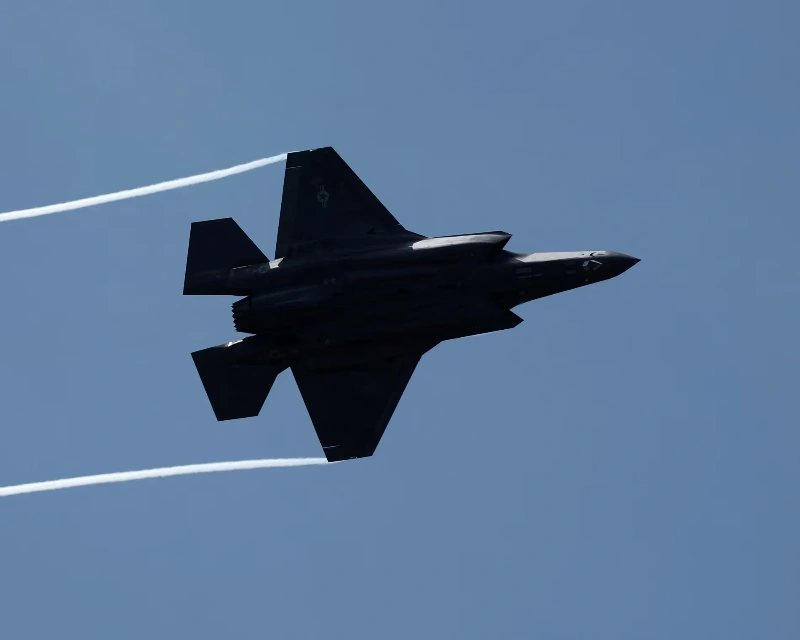UK to Boost Nuclear Deterrent with US Jets Carrying Warheads

The UK plans to significantly increase its nuclear deterrent by purchasing a squadron of American-made fighter jets capable of delivering US tactical bombs, which are likely to be housed on British soil.
Keir Starmer's revelation at the NATO summit signals the most significant shift in Britain's nuclear posture since the end of the Cold War, with US weapons due to return to the country, and is sure to cause concern among arms control experts and campaigners.
According to the plan, the UK will purchase 12 F-35A fighters capable of carrying conventional munitions, as well as the US B61-12 gravity bomb, a type with the devastating strength of more than three times the nuke used on Hiroshima.
"In an era of radical uncertainty, we can no longer take peace for granted," Starmer is slated to say. "These aircraft will strengthen our armed forces and support communities across the country through our defence industry."
US nuclear weapons have not been housed in the UK since the last left RAF Lakenheath in 2008, and Britain had not had air-launched nuclear missiles since 1998 when the WE177 was decommissioned by the then-Labour government.
Since then, the UK's nuclear deterrent has been delivered only by its Trident submarine fleet, whose bombs have enough destructive capacity to destroy a metropolis. However, military planners believe that a "substrategic" capacity should be developed that might be used on the battlefield to discourage a Russian attack on a NATO territory.
The F-35As will be stationed at RAF Marham in Norfolk. They will contribute to NATO's dual capability aircraft (DCA) programme, which is part of the alliance's long-standing goal to deter adversaries with a shared, US-led nuclear umbrella.
Similar arrangements have prevailed since the Cold War in Germany, Italy, Belgium, the Netherlands, and Turkey. In any instance, nuclear weapons belong to the United States. The president controls them, as they cannot be sold or transferred to another country under the rules of the Non-Proliferation Treaty. Officials stated that the UK would continue to comply with the international accord.
The Ministry of Defence has a long history of not reporting on where nuclear weapons are deployed; nonetheless, there are vaults at RAF Marham where British tactical weapons were previously held, albeit their readiness is unknown.
Old nuclear weapon storage bunkers can be found at neighbouring RAF Lakenheath, which the US Air Force utilizes. They are being upgraded as part of US taxpayer-funded initiatives even though the American facility is 20 miles away.
According to the Federation of American Scientists, the B61-12 is intended with four different explosive yields: 0.3 kilotons (kt), 1.5 kt, 10 kt, and 50 kt. In comparison, the Hiroshima bomb, which killed between 70,000 and 140,000 people, had an explosive yield of 15 kt.
Officials stated that the new jets would support more than 20,000 jobs and over 100 UK suppliers, despite the fact that they are made by US defence corporation Lockheed Martin.
Ministers have also underlined the financial savings of switching from the F-35B, which costs around £100 million, to the F-35A, which they claim will save up to 25% per aircraft. The purchase is part of a long-term strategy to acquire up to 138 F-35s in total.
Starmer went on: "Supporting 100 businesses across the country and more than 20,000 jobs, these F35 dual-capable aircraft will herald a new era for our world-leading Royal Air Force and deter hostile threats that threaten the UK and our allies."
Mark Rutte, NATO's secretary general, commended the move as "a robust British contribution to the alliance".
The decision follows this year's strategic defence review, which warned of increased global instability and renewed nuclear threats. The defence secretary, John Healey, stated that the news represented a "Nato-first" approach and that defence would serve as a "growth engine" for the UK economy.
The government has cautioned in a newly released security strategy that Britain must prepare for the risk of being attacked on its soil. Russia's military buildup, along with Iran's rising attacks on dissidents abroad, suggests that the country may soon be embroiled in an internal war, according to the study.
"For the first time in many years, we have to actively prepare for the possibility of the UK homeland coming under direct threat, potentially in a wartime scenario," the committee's report stated.
The threat resembled Rutte's recent remarks that British citizens "better learn to speak Russian" unless defence spending is significantly increased. Starmer, who is attending the NATO meeting in The Hague, has pledged to reach NATO's aim of spending 5% of GDP on defence by 2035.
The security assessment goes into further depth about the challenges that the country faces both at home and abroad, naming Russia as the most serious, citing the Kremlin's repeated cyber-attacks and sabotage attempts.